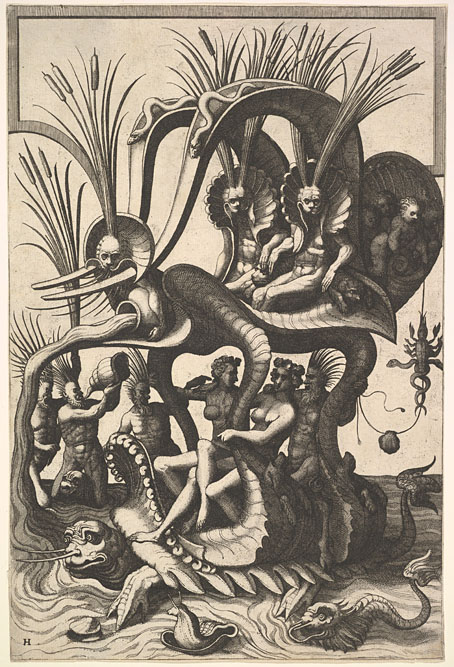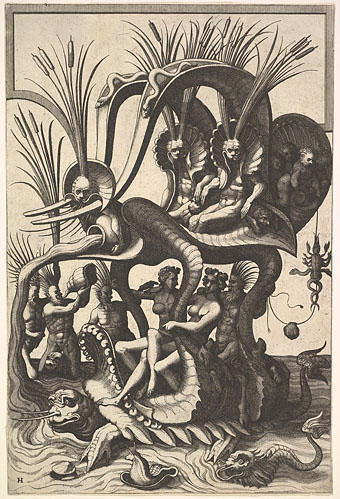Fantastic Sea Carriage (1556) by Johannes van Doetecum the Elder & Lucas van Doetecum, after Cornelis Floris the Younger.
• “Preiss and McElheny have acknowledged the influence of Jorge Luis Borges’s short story ‘The Library of Babel’ (1941), which offers a brilliant, brain-scratching disquisition on bibliotecas as conduits both of infinity and meaninglessness. I also found myself thinking of Arthur Fournier, in D. W. Young’s documentary The Booksellers (2019), who spoke of ‘the psychic dreaming that paper allows.'” Sukhdev Sandhu on The Secret World, a film by Jeff Preiss and Josiah McElheny about the books collected by Christine Burgin.
• Most people know Burt Shonberg’s paintings—if they know them at all—from their appearance in Roger Corman’s Edgar Allan Poe films. But Shonberg had a career outside the cinema, something explored in Momentary Blasts of Unexpected Light: The Visionary Art of Burt Shonberg, an exhibition currently running at the The Philosophical Research Society in Los Angeles.
• Warriors (1996), an ad for Murphy’s Irish Stout directed by the Quay Brothers. Samurai warriors in an Irish pub scored to the theme from Yojimbo.
The Grand Jeu group have been neglected, at least in English-speaking history, from the general consciousness of “Surrealism” but they remain among its most interesting dissidents. The teenage Simplistes, led by [René] Daumal and [Roger] Gilbert-Lecompte, collectively experimented with consciousness and investigated wildly syncretic modes of destroying and recombining selves: diverse hermetic and occult systems, extrasensory perception, trances and somnambulism, mediumistic practice and collective dreaming.
[…]
The Grand Jeu was a project of paradox: artistic and ascetic, indulgent and severe, political, and mystical, ecstatic and negating, egoistic and selfless, graceful and violent. It sought to continually weave between collectivity and individuality, of art and life, multiplicity and unity, fed by a brew of political radicalism, inspired by Rimbaud’s germinal poetics of revolt and illumination, a utilitarian embrace of occult traditions and ideas, drug experimentation, Hindu sacred texts (Daumal would become an expert in Sanskrit) and some of Bergson’s philosophy. They were, in their own words, “serious players.” It was a mad mix, and in retrospect, clearly doomed to a short life—so, it turned out, were most its members.
Gus Mitchell on the “experimental metaphysics” of the Grand Jeu
• At Smithsonian magazine: Lanta Davis and Vince Reighard on the sculpted monsters and grotteschi that fill the Sacro Bosco at Bomarzo, Italy.
• At Bandcamp: George Grella compiles a list of “spooky sounds and spooky music, things to haunt nights and dreams”.
• At Colossal: Kelli Anderson’s amazing pop-up book, Alphabet in Motion: How Letters Get Their Shape.
• “The play that changed my life: Jim Broadbent on Ken Campbell’s electrifying epic Illuminatus!”
• DJ Food browses some of the many album covers designed by the versatile Robert Lockhart.
• Winners of the 2024 Nikon Photomicrography Competition.
• Mix of the week: XLR8R Podcast 873 by Andy Graham.
• The Strange World of…Lou Reed.
• The Internet Archive is back!
• Warriors (1990) by Jon Hassell | Red Warrior (1990) by Ronald Shannon Jackson | Bhimpalasi Warriors (2001) by Transglobal Underground


